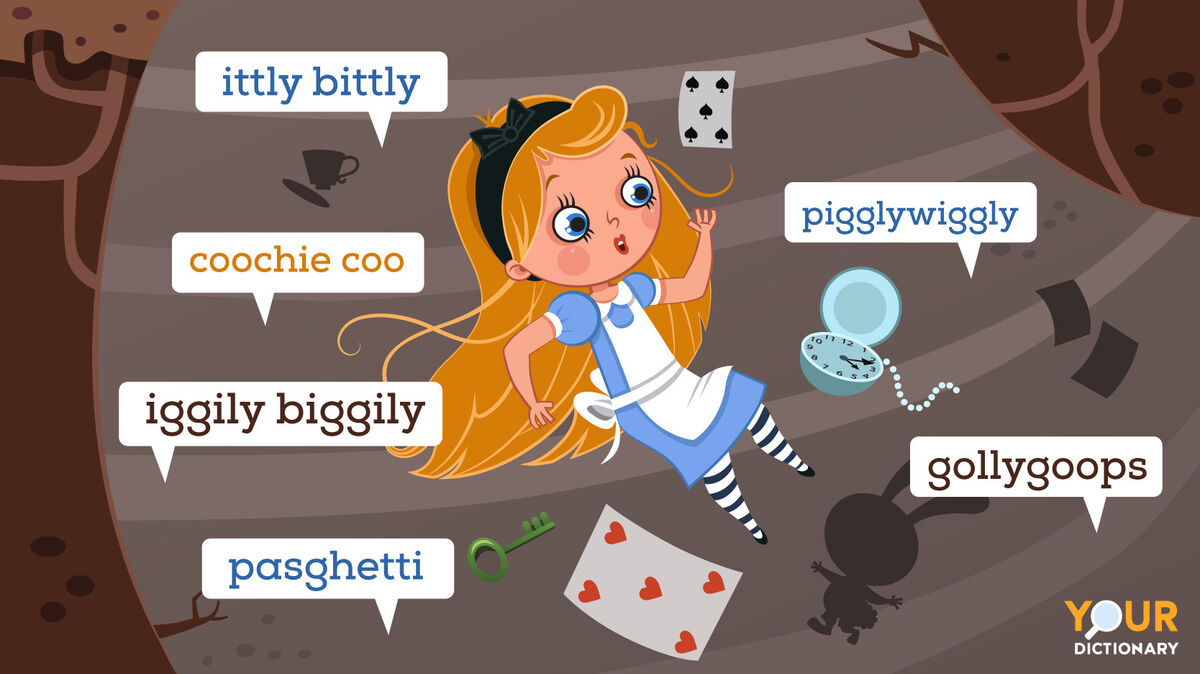
Whether you are speaking to a small child or can’t think of words to describe something, you have likely resorted to speaking gibberish at some point. Gibberish consists of speech sounds that are not real words and have no real meaning, but it can also be sounds that are added to real words in order to form a “secret language.”
Gibberish Is Nonsensical
When you speak or say words, the words are supposed to have meaning. Gibberish, however, sounds like words or speech but really has no meaning at all. Gibberish can take the form of a single nonsensical word or a group of nonsensical words. While the words themselves have no definition, the context around them gives them meaning. Gibberish words can be exclamations or stand-ins for real words.
Examples of Gibberish Words
These examples of words that sound like normal speech are really gibberish.
supercalifragilisticexpialidocious
iggily biggily
gollygoops
ittly bittly
pasghetti
coochie coo
pigglywiggly
woospiedoo
scribble scrabble
spindingy
zowzy
tipsy topsy
bazinga
dingly dangly
Examples of Gibberish in Sentences
While the words in these gibberish sentences don’t make sense, you can interpret them in context because the words around them give the gibberish words meaning.
I asked her if she liked her gift and she said it was "supercalifragilisticexpialidocious."
"Where do you want this dingly dangly thing?”, he asked, holding up a cable.
“Bazinga!” he exclaimed after his team scored a touchdown.
I’m so excited, I got a used car in tipsy topsy condition.
I scribble scrabbled in the margins of my notebook.
The kittens are so ittly bittly!
Famous Gibberish Examples
Sometimes the best way to understand a concept is by hearing or seeing it. Several writers and creators have used gibberish in their works for comedic or whimsical purposes.
Jabberwocky by Lewis Carroll
The poem "Jabberwocky" in Lewis Carroll's Through the Looking Glass is perhaps the most famous example of gibberish. Lewis Carroll, whose real name was actually Charles Lutwidge Dodgson, was famed for his love of nonsensical language and inventing new words. Here is an extract from the poem:
"Twas brillig, and the slithy toves
Did gyre and gimble in the wabe;
All mimsy were the borogoves,
And the mome raths outgrabe.
Beware the Jabberwock, my son!
The jaws that bite, the claws that catch!
Beware the Jubjub bird, and shun
The frumious Bandersnatch!"
The Great Dictator by Charlie Chaplin
One of the most famous cinematic examples of gibberish is Charlie Chaplin’s 1940 film The Great Dictator. In it, Chaplin plays Adenoid Hynkel, a clear parody of Adolf Hitler, who is the dictator of Germany and aspires to be dictator of the world.
Chaplin came from the era of silent film, but by 1940 everyone was making movies with sound. True to his style, he opted not to speak for his other role in the film — the iconic Tramp character he had portrayed since the 1920s — but spoke often as Hynkel by uttering rapid-fire German-sounding gibberish. There are no “translations,” which adds to the humor and horror of the scene as English-speaking audiences at the time would have heard Hitler on the radio regularly without understanding what he was saying.
Gibberish: The Language
In addition to nonsense words, phrases and sentences, there is also a pseudo-language called Gibberish. The language is similar to Pig Latin and is used by people who want to play games with a secret language. In Gibberish, you simply add a nonsense sound to a preexisting word and insert this sound into every word.
To speak the Gibberish language, break each word down into its syllables. Each syllable will usually have a vowel sound. Then add othag before each vowel sound. Some examples of Gibberish words (and their English translations) include:
Hothagellothago (Hello)
Hothagow othagare yothagou (How are you?)
Mothagy nothagame othagis (My name is)
Whothagat othagis yothagour nothagame? (What is your name?)
Hothagow othagold othagare yothagou? (How old are you?)
Whothagat tothagime othagis othagit? (What time is it?)
Whothagat othagis thothage othaganswothager? (What is the answer?)
Whothago othagis thothagat? (Who is that?)
Whothagat dothagid othagi mothagiss? (What did I miss?)
Cothagall mothage (Call me)
Trothagee (tree)
Other Nonsense Sounds
You can also insert other nonsense sounds following this pattern. For example:
idig (“hi” becomes “hidigi”)
iddag (“hi” becomes “hiddagi”)
uvug (“hi” becomes “huvugi”)
Have Fun With Language
Language is meant to be fun as well as functional. Here are some devices you can use to have fun with words and sounds.